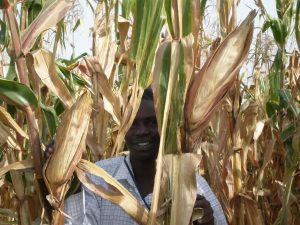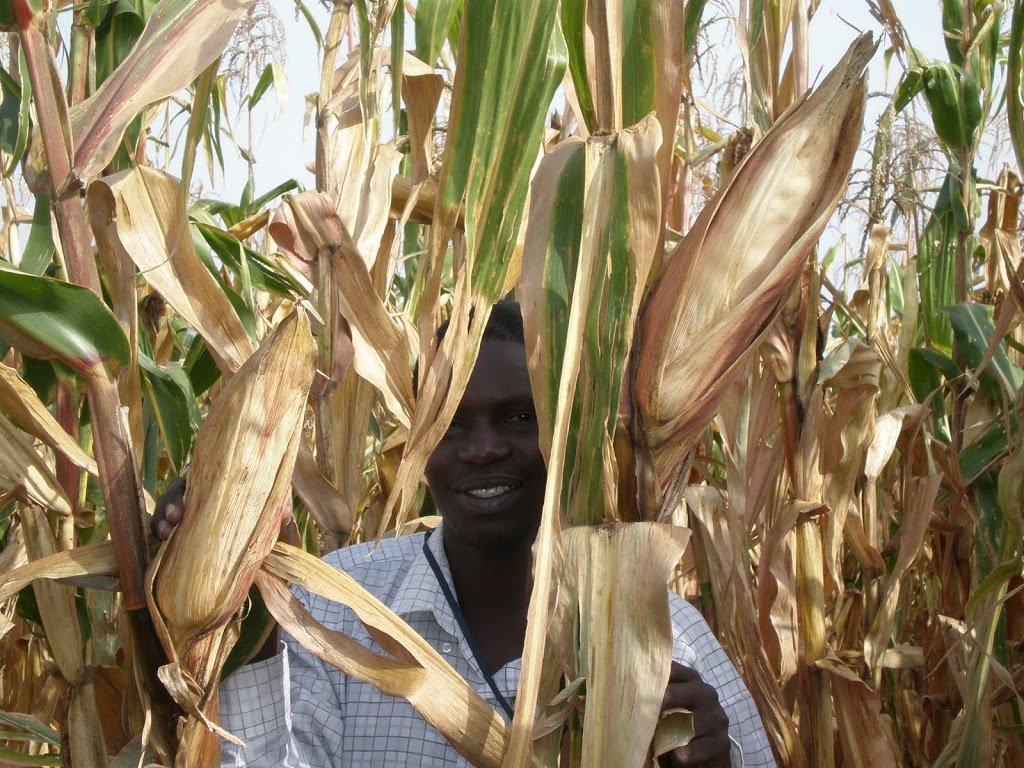Nuru seeks to empower impoverished communities to become entirely self-sustaining within five years. To make this happen, we focus on two main faces of sustainability in order to pass the walk away test: financial sustainability and leadership sustainability. Both are absolutely critical to enabling our communities to be completely independent of Nuru US within that five year mark.
First, financial sustainability. We are trying to achieve financial sustainability by pursuing revenue generation projects in all five areas of development: agriculture, watsan, health, education, and community economic development. These models include interest income from agriculture loans, agribusiness revenues from maize trading and speculation, a well buy-in program, micro-lending, transaction fees from mobile banking services, etc. I am excited to report that some of these initiatives are already starting to bear fruit in the Kuria project. We measure and track our movement toward financial sustainability of the project by monitoring something we call the sustainability ratio: revenues generated by the project divided by expenses of the project. A sustainability ratio of 100% means that the project is financially sustainable. I have projected that by the by the end of 2010, our sustainability ratio will be close to 35%! I am very excited about these early results, but this blog post isn’t about financial sustainability…I can talk more about that some other day. This post is about something I am even more excited about: the gains we have made toward the leadership sustainability of the project.
I am passionate about leadership. Most of my adult life has been about leadership, and learning to understand its importance in achieving lofty goals/missions/results in any field. I am what I call a life learner in leadership because the more I learn, the more I realize that I have a long, long way to go. I have learned many lessons – most of them the hard way by messing up – about effective leadership, and I have tried to apply these lessons as I have grown as a leader. At Nuru, training and equipping service minded leaders in our partner communities is fundamentally the most important piece of our model, and we are very serious about this task. Recently, we started a project lead by Chelsea Barabas (one of our international program managers) to codify our leadership emphasis by creating the leadership curriculum by which we train all Nuru leaders – international and domestic. This leadership curriculum will include a plan to identify and screen for effective leaders in a project and then train and equip them to own and then grow their programs throughout the five years of the project and beyond. It is an aggressive project that Chelsea will be tackling over the next 9 months that includes in-depth research into other organizations and corporation and a close look at (through research and interviews) effective leaders of all shapes and sizes from all sectors. She will be studying what the best of the best say about how to become and how to train effective leaders. I say all of this as an introduction to the story that follows – the story of a Nuru leader who has me very excited about the future of Nuru Kenya and our progress toward leadership sustainability.
I walked hurriedly through the muddy field trying to keep up. I was doing my weekly field visits with Andrew, two of his Field Managers, and Gugwa, one of his Field Officers. I love these days of trekking through the ten-foot high maize to check in on the progress of the farmers and listen to the challenges they are facing or just happily listen to a farmer gushing with pride as she shows off her maize to us. On this particular day though, as I swept aside the big leafy maize winding our way through shamba (farm) after shamba of tall maize, I was deep in thought and unusually quiet. Normally, I used these days to try and engage Andrew and the Field Officers in conversation in an attempt to learn more Kiswahili or Kikuria from them (they are incredibly patient teachers), but today I had grown silent as I got lost in my own thoughts.
Throughout the previous couple weeks, I had been contemplating a radical new move in strategy for the project – as a test to measure progress in our leadership sustainability. I will be leaving the project in mid-July, and I hadn’t hired an agriculture program manager to replace me. Our typical model is to rotate our western staff out every seven month to prevent dependency from forming in the Nuru Kenya community leaders on individual personalities on the western team. These Program mangers (western staff) act as mentors and advisers to our Nuru Kenya counterparts and guide the overall strategy of the project toward exit at year five. Program managers do a one month turnover with new program mangers coming in to maintain continuity of the project, but the Kenyan team forms the main consistency and face of the project to the community – further empowering them toward a sustainable exit.
All program mangers had been identified and hired except for agriculture. The agriculture program here in Kuria is the furthest along of the five programs in our track toward sustainability, so I had decided to try a somewhat risky experiment. I decided that we would “gap” the agriculture program on the western staff side for a period of nine months – leaving a Kenyan fully in charge of strategy, operations, and scaling of the project. This is a very critical time in our project because we are about to go from serving 900 farmers to serving approximately 1,700 farmers in this next rainy season – plus we are scaling to entirely new divisions outside our normal operating area. If we can prove successful in this 9 month experiment during this crucial phase of our development, we will be well on our way toward leadership sustainability of the project. Andrew would be the key to the success or failure of that experiment.
 Andrew Sinda is the leader of the agriculture program for Nuru Kenya. He has grown to become a selfless leader respected widely throughout our area of operations. He inspires motivation and hard work in all the farmers he leads. He is a humble, quiet servant leader who is welcomed everywhere he goes. The farmers trust him with everything they have and they trust him with their future hopes and dreams for their families. Why? Because he cares for them and he has earned that trust. Andrew doesn’t sit behind a desk dictating the fate of the 900 farm families he currently leads. He is in the field constantly…leading every day by example. He inspires his farmers and all who work under him to achieve levels of performance they didn’t think previously possible. I have grown to really respect and trust Andrew as well. He teaches me lessons in the field every week, and he doesn’t even know it – not just about Kiswahili – but about leadership.
Andrew Sinda is the leader of the agriculture program for Nuru Kenya. He has grown to become a selfless leader respected widely throughout our area of operations. He inspires motivation and hard work in all the farmers he leads. He is a humble, quiet servant leader who is welcomed everywhere he goes. The farmers trust him with everything they have and they trust him with their future hopes and dreams for their families. Why? Because he cares for them and he has earned that trust. Andrew doesn’t sit behind a desk dictating the fate of the 900 farm families he currently leads. He is in the field constantly…leading every day by example. He inspires his farmers and all who work under him to achieve levels of performance they didn’t think previously possible. I have grown to really respect and trust Andrew as well. He teaches me lessons in the field every week, and he doesn’t even know it – not just about Kiswahili – but about leadership.
I was nervous about this new experiment in leadership for the project, but I knew that if anyone could do it, Andrew could. He dropped behind a bit leaving Gugwa to talk with the Field Managers about the shambas we were approaching. “Mr. Jake,” he said. “You are somehow quiet today.” This guy doesn’t miss anything. “I know,” I said as I shook myself out of my contemplative state. I knew it was time to tell him. “Andrew, you know I am leaving in July, right?” “Yes. You have told me. Who will be coming to replace you this time?” he asked. “Well…that’s just it,” I said. “No one is coming. I have been meaning to tell you, Andrew.” I took a deep breath. “You will be the next program manager for the agriculture program. No mzungu (white dude) is coming to lead the ag program with this next team.” I stopped walking and looked at his face to gauge his reaction. “Ahhh, OK,” he said thoughtfully as he looked down. He looked back up at me. “But I am fearing you to go.” My heart sank a bit. “He’s worried that he isn’t ready. It must be an overwhelmingly heavy feeling to know that he will be leading this without any help,” I thought. I began to worry about my decision. Maybe I had been a bit too aggressive in our strategy. “It’s going to be all right Andrew. You are more than capable of handling this project. You have the tools you need, and I know that you will do well. The farmers trust you and you are ready,” I said. Andrew looked at me with his bright smiling eyes that I suddenly noticed were full of confidence. “You are not understanding me,” he said. “In truth, we will be fine. We are ready. You have trained us, and we will not let you down.” He paused. “I am only fearing because you are my family and my friend and I will miss you.” He smiled, turned and disappeared into the maize ahead of us to link up with the others chatting with the next farmer up ahead. “And I you, my friend,” I thought. “And I you.”


